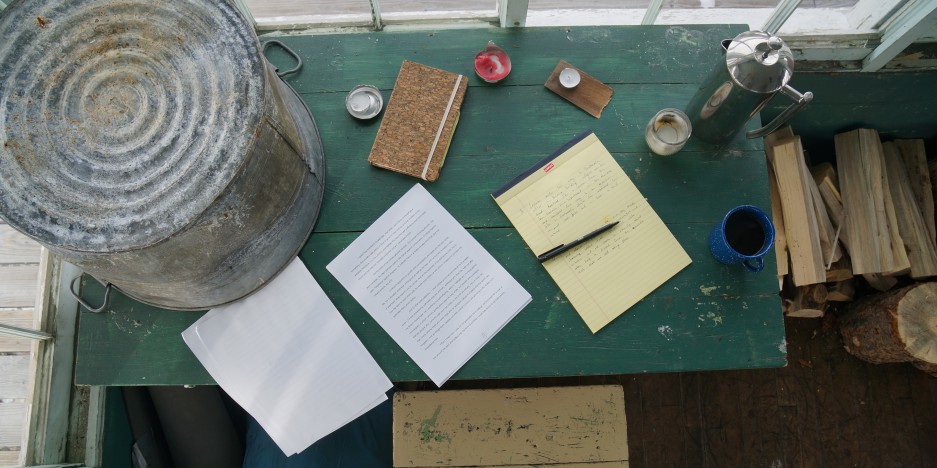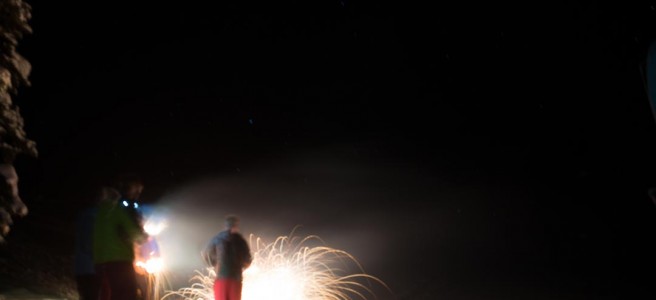The day the fire started it was one of those hot August afternoons where the creosote sweats black from the railroad timbers and the raptors that hunt along the fencelines don’t flap their wings but every once in a while. Up the road a pair of swaybacked drafthorses browsed over brittle grass and dodged the sun beneath the few alders that lined their fence. Get your things, she told the boy, and he went to his room to fill a bag with his folded clothes and dinosaur books and the rock he found in the river with the stripes of purple in it. Just one bag, they’ll be here soon and we’ll have to go.
Upstairs, the boy looked around the room. The errant things of boyhood were scattered around or pasted to the walls. Grass-stained blue jeans poked from under a hastily made bed. Faded posters of the World Series hung askew above piles of brokeback National Geographics. A mason jar sat on the dresser, half-filled with gifts of square shaped coins and a small elephant carved of ivory. A .30-30 shell all turquoise with corrosion and a bone-handled folding knife.
The boy reached into the jar and removed the heavy, pale-colored knife. He opened the two blades and pressed them, first one, then the other, against the meaty part of his palm. They had been honed to thin strips of rusted steel from two lifetimes of sharpening but were dull now and didn’t break the skin. He placed it next to the jar.
He walked down the stairs, setting his feet carefully on the edges of certain steps. He knew which ones squeaked in the middle and tried to move silently even though now the woman waited for him downstairs and he wasn’t sneaking anywhere. The last three steps creaked no matter where the boy stepped on them so he leapt, with one hand on the wall and the other on the banister, and set himself softly on the floor. Be careful, she said, and hurry.
She took a thick, worn book from the shelf and held the soft leather backing between her hands. The family album, she heard her mother’s voice, is the only thing you go into a burning house for. Between its covers were old photos of grandparents she didn’t know and sunburned summers at the lake. Birth certificates and death certificates and a wedding photo of her parents that was mostly all yellow now. She didn’t open the book but tucked it under her arm and with her other hand held the boy’s. He looked like he would cry. He didn’t and when she squeezed his hand he squeezed back. Don’t cry, Momma, he said.
That morning before the fire started and they had to leave it had been cool and dew beaded on the yellow grass behind their timber house. She made pancakes for the boy because it was a Saturday and the school bus wouldn’t come to the end of the gravel driveway and open the door and take him away. The huckleberries were gone but she had a bag of them in the freezer and she put them in his pancakes the way he liked.
She had gone outside and wetted the garden with a hose so that the sun would not scorch the palegreen leaves of the butter lettuce heads. The boy had ridden his bicycle up and down the gravel road and fed carrots and potatoes to the horses that lived near them. He liked to feed them vegetables from the garden and she scolded him but not so harshly that he didn’t still sometimes sneak through the gate and pull up a turnip or a carrot. They were chestnut colored with tufts of blond around their feet and very tall, but they seemed to like the boy and were gentle when he fed them.
When the sky turned dark it was still warm but the wind was blowing and the boy went home and left his bike in the yard. She scolded him about leaving his bike out in the rain and he said, I’m sorry Momma and moved it to the shed where it would stay dry and not rust later. She said it’s ok but when lightning struck from the storm and the wisps of smoke crept down the valley and in through the kitchen window she said they would leave the bike in the shed and hope it didn’t burn. She turned the sprinkler from the garden to the roof of the house and the smoke from the fire came more thickly and it tickled the boy’s throat.
After the smoke wafted down the valley and through the open window she answered a knocking on the door and it was another boy who looked not a lot older than her own. He wore heavy leather boots, green trousers, and a dirty yellow shirt. He told her that they would have to leave their home and that he would do his best to help. It was her mother’s home she said and now it’s just a house. The boy in the yellow shirt said yes ma’am and tried very hard to look solemn but couldn’t help the way the corners of his mouth curled like in a smile. She wasn’t even sure she saw a smile as much as sensed that it was there, the movement of his lips was so small. It was the kind of smirk that young men get when there’s a story to survive. They know it comes with heartbreak but sorrow in the telling will make them more a man, they think. She couldn’t hate him for hoping for disaster and thanked him and he left.
Get your things, she told the boy. Just one bag, they’ll be here soon and we’ll have to go.
Things Left Behind originally ran in Camas Magazine. You can find the rest of the story in the Winter 2015 edition.

